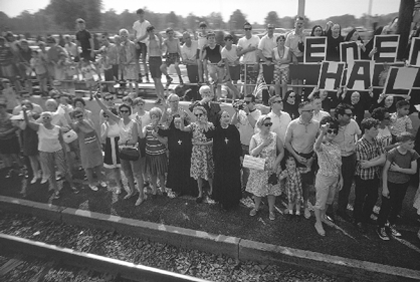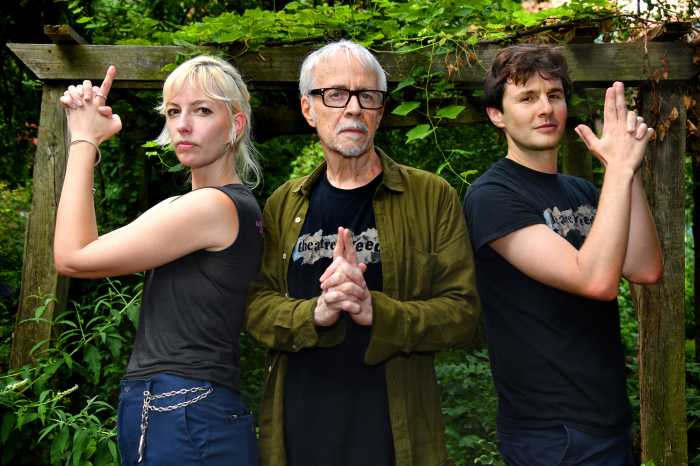By Jerry Tallmer
Dear reader of this story:
A Scottish filmmaker named Keith Alexander wants to ask you if you remember where you were on June 8, 1968, and if, on that hellish hot day 38 years ago, it was somewhere alongside the railroad tracks leading from New York City to Washington, D.C., or even perhaps aboard a train carrying a coffin down to Washington on those tracks that long Saturday afternoon. If you were beside those tracks or on that train, Mr. Alexander would very much like to hear from you.
“RFK Funeral Train” is the name and subject of the documentary movie he and his associates — producer Jennifer Stoddart in Edinburgh, producer Charles Hobson in New York — are about to make, based on the dozens of clusters of stricken trackside faces and stances caught forever that day by Magnum photographer Paul Fusco and preserved in a 2001 hardcover and softcover book of the same title, “RFK Funeral Train.” The idea for the film was Ms. Stoddart’s.
You may have been in one of those photographs, or you may know someone who might have been. “If you have your own story to tell about that day, or if you know someone else who was there,” says an e-mailed flyer from the Alexander production team – forwarded to The Villager via the unmistakable Scottish burrs and thistles of Keith Alexander’s son Thomas — “please contact Lichen Films at (212) 938-0026, or e-mail rfkfuneraltrain@gmail.com.”
“The Scottish folks look at Robert Kennedy as an inspiration, a force for good,” says American co-producer Charles Hobson, “and certainly” — “certainly for me,” he meant, without saying it — “Kennedy represented hope.”
The Robert F. Kennedy who was assassinated at 42 would be 81 — think of it! — if he were alive today. Charles Hobson, founder and prizewinning artistic director of Vanguard Documentaries, was born 70 years ago in Bedford-Stuyvesant. He remembers “when the Y was segregated. When the National Guard was segregated.”
His “Inside Bedford-Stuyvesant” was, he says, “the first black-produced television program” in this country. “And the day the program was announced was the day Martin Luther King [Jr.] was shot [April 4, 1968, two months and one day before RFK]. The day it was broadcast on Channel 5 was the day of King’s funeral.”
There are many black faces along those railroad tracks in Paul Fusco’s photographs; something more than half of the hundreds of thousands of Americans who turned out to wait by the tracks for this train — as for the one a century earlier bearing the body of Abraham Lincoln home to Springfield, Illinois — were black.
Hobson was at work at radio station WBAI the night Robert Kennedy was killed. “Everybody’s first thought was: Riots. I went off to Chicago, a big black metropolis where Mr. Daley was mayor, you may remember. And nothing happened.”
What happened was some months later, during the Democratic National Convention, and the tumult wasn’t black, as such — though the stage had been set for it by those two assassinations, and one war.
Keith Alexander, former head of Music and Arts for BBC Scottish Television, has distinguished himself with films about Titian, about the theft of Munch’s “The Scream,” about Red Adair, battler of North Sea oil fires, and about the battle over the building of a tree-house in a radical Scottish “free” school (“The Holly Hut”).
He and his “RFK Funeral Train” crew are, he says, “also keen to hear from anyone with family photographs or home movies documenting the dramatic events of that day” — June 8, 1968.
I know where I was — covering an Off-Broadway play, the (then) unprecedented “The Boys in the Band,” with, before the show and at intermissions during the show and after the show, a portable radio clutched to my ear, carrying fragments of news of the Robert Kennedy funeral train as it worked its way down to Washington, with two dead beside the tracks, in that heat, when hit by an express coming the other way. And everybody in the tiny theater lobby begging to borrow the radio to listen in. And I, who was no RFK man — but of course had gone in three nights earlier to write the obituary for my newspaper, all through that night to deadline at sunrise June 6 — still in some sort of Camus-like shock. Sisyphus and the stone. Beside those tracks. With Richard J. Daley’s Chicago just waiting, waiting, out there — in Abraham Lincoln’s Illinois.





































